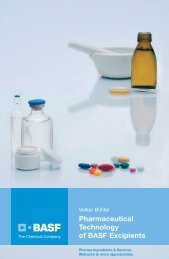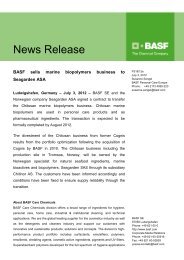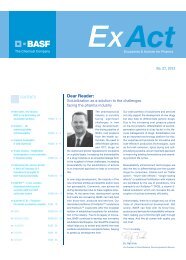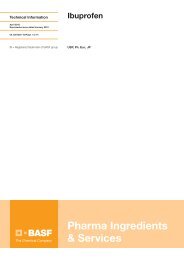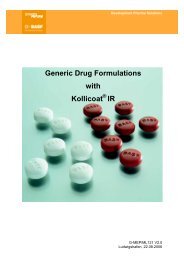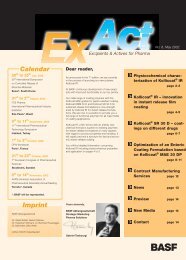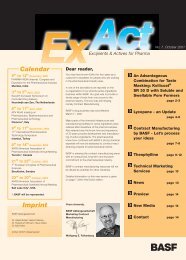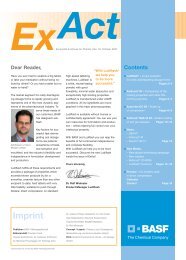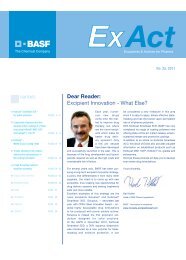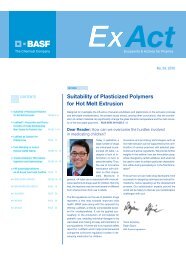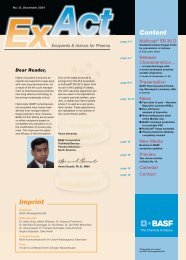Dear Reader: Innovations across the entire package - Pharma ...
Dear Reader: Innovations across the entire package - Pharma ...
Dear Reader: Innovations across the entire package - Pharma ...
You also want an ePaper? Increase the reach of your titles
YUMPU automatically turns print PDFs into web optimized ePapers that Google loves.
Excipients & Actives for <strong>Pharma</strong><br />
No. 26, 2011<br />
CROSPOVIDONE<br />
Binding properties and flow behavior of<br />
different crospovidone grades<br />
C.Tissen, M.Hilkens, J.Lorenz, P.Kleinebudde Institute of <strong>Pharma</strong>ceutics and Biopharmaceutics, Heinrich-Heine-University Duesseldorf, Germany<br />
INTRODUCTION | Crospovidone is a superdisintegrant<br />
commonly used in quantities of 2-5 %<br />
(w/w) to accelerate <strong>the</strong> disintegration of tablets.<br />
Several grades of Kollidon CL are commercially<br />
available and differ only in particle size distribution.<br />
The drawbacks of traditional disintegrants<br />
are often poor flowability or a negative influence<br />
on <strong>the</strong> compactibility of tableting mixtures.<br />
However, robust mechanical properties and low<br />
friability should be achieved in order to facilitate<br />
fur<strong>the</strong>r production steps, e.g. coating processes.<br />
Therefore, a combination of a dry binder and a<br />
disintegrant is often required to improve <strong>the</strong><br />
mech anical properties of a tablet while still ensuring<br />
complete disintegration.<br />
The purpose of this study was to investigate <strong>the</strong><br />
binding properties of crospovidone grades of<br />
different particle size distributions and elucidate<br />
<strong>the</strong>ir influence on tensile strength.<br />
METHODS AND MATERIALS | Materials<br />
Crospovidone (Kollidon CL, Kollidon CL-F,<br />
Kollidon CL-SF, BASF SE, Ludwigshafen, Germany),<br />
alpha-lactose monohydrate (Tablettose ®<br />
80, Meggle, Wasserburg, Germany), dicalcium<br />
phosphate (Dicaphos ® AN, *Budenheim, Germany),<br />
magnesium stearate (Welding, Hamburg,<br />
Germany).<br />
Methods / Particle size distribution The particle<br />
size distribution of <strong>the</strong> various Kollidon CL<br />
grades was analyzed using laser light diffraction<br />
(Helos, Sympatec GmbH, Clausthal-Zellerfeld,<br />
Germany). Measurements were performed in<br />
triplicate with a dry dispersing unit (Vibri, Rhodos<br />
T4.1, Sympatec GmbH, Claustha-Zellerfeld,<br />
Germany) at 1.0 bar.<br />
Flowability The flowability of <strong>the</strong> tabletting mixtures<br />
was analyzed in duplicate with a ring shear<br />
tester (RST-01.c, RST-CONTROL 95 Schulze<br />
Schuettguttechnik, Wolfenbuettel, Germany).<br />
Consolidation stress and unconfined yield<br />
strength were used to characterize flowability.<br />
Normal stress during pre-shearing was 5000 Pa.<br />
Compression of tablets Table 1 shows tabletting<br />
mixtures containing different ratios of filler<br />
(Tablettose 80, Dicaphos AN) and disintegrant<br />
(Kollidon CL; Kollidon CL-F, Kollidon CL-SF).<br />
Each formulation was blended for 20 minutes in<br />
a laboratory-scale Turbula mixer (Turbula T2F,<br />
Bachofen AG Maschinenfabrik, Basel, Switzerland).<br />
Afterwards, 0.5% w/w magnesium stearate<br />
was added as a lubricant and <strong>the</strong> mixtures were<br />
blended for two fur<strong>the</strong>r minutes.<br />
Each mixture was compressed to flat-faced tablets<br />
of 12 mm diameter at 153 and 255 MPa, using<br />
a rotary die press (Pressima, IMA Kilian, Cologne,<br />
Germany). Crushing forces were determined with<br />
a hardness tester (HT-1, Sotax, Basel, Switzerland)<br />
and subsequently calculated as tensile<br />
strength according to Fell and Newton [1].<br />
TABLE 1<br />
Fraction [%]<br />
Filler 100 95 90 80 60 40 0<br />
Disintegrant 0 5 10 20 40 60 100<br />
Tabletting mixtures<br />
Disintegration testing The disintegration time<br />
for 12 tablets of each batch was measured with<br />
a disintegration tester (Erweka ZT 32, Heusenstamm,<br />
Germany) according to Ph.Eur. Because<br />
of <strong>the</strong> extreme turbidity of <strong>the</strong> disintegration<br />
medium after a few seconds, all batches were<br />
analyzed without using a beaker.<br />
RESULTS AND DISCUSSION | Discussion<br />
The tensile strength of <strong>the</strong> lactose/crospovidone<br />
tablets varied from 0.9 to 5.1 N/mm² (Figure 1).<br />
Irrespective of <strong>the</strong> amount of Kollidon CL, <strong>the</strong><br />
tablets exhibited no increase in tensile strength.<br />
In contrast, crospovidone grades with smaller<br />
particle sizes led to improved tensile strength.<br />
The higher <strong>the</strong> amount of Kollidon CL-F and<br />
Kollidon CL-SF, <strong>the</strong> higher <strong>the</strong> tensile strength<br />
of <strong>the</strong> resulting tablets. As <strong>the</strong> particle size of<br />
crospovidone decreased, <strong>the</strong> detected tensile<br />
strength increased (Figure 2). The tensile strength<br />
of tablets is known to be affected by <strong>the</strong> variation<br />
in particle size of <strong>the</strong> excipients used. Smaller<br />
particles facilitate interparticulate bonding during<br />
<strong>the</strong> compression process, resulting in tablets<br />
with improved hardness [2]. Consequently, tablets<br />
with Kollidon CL-SF exhibited <strong>the</strong> highest<br />
values. Even 20% (w/w) almost doubled <strong>the</strong> determined<br />
tensile strength.<br />
All crospovidone grades could successfully<br />
be compressed to tablets without filler; tablets<br />
consisting of pure Kollidon CL-SF exhibited <strong>the</strong><br />
highest tensile strength.<br />
Page 5



